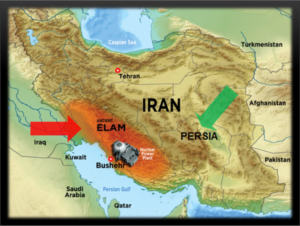
The Bible tells us that Jesus will be from Nazareth, yet born in Bethlehem, and that He will come out of Egypt. This all seems incoherent at first glance, doesn’t it? Regardless, what we discover in the New Testament is that our Savior fulfilled all these prophecies to the “T.” When God speaks through one of His prophets, you can be assured it will be fulfilled completely and in His perfect timing.
“Declaring the end from the beginning, and from ancient times the things that are not yet done, saying, My counsel shall stand, and I will do all my pleasure.” (Isaiah 46:10)
Sadly, the professing Church of today almost completely ignores and neglects the study of prophecy, a neglect which results in the loss of one of the most powerful weapons against unbelief. That the denial of the Bible as the inspired Word of God has become widespread in the West is but one result of this. But in other parts of the world, this is not true.
Last week there was an event overseas that served reminder of a prediction made almost 2600 years ago that has been vastly overlooked by many Bible scholars, and that the Church should be aware. On Saturday a missile attack on Saudi Arabia’s oil infrastructure by a combination of cruise missiles and drone missiles were launched by Iran’s Revolutionary Guards from Khuzestan and the Anbar province of western Iraq, according to multiple sources.
The prophet Jeremiah predicted a portion of Iran would one day undergo a massive disaster, that this epic event would be caused by the Lord, occur in the latter days, and precipitate the worldwide dispersion of many Iranian exiles. Specifically, he stated that there would be “no nations” that these exiles “will not go.” Where will this occur? Elam.
“The word of the Lord that came to Jeremiah the prophet against Elam in the beginning of the reign of Zedekiah king of Judah, saying, Thus saith the Lord of hosts; Behold, I will break the bow of Elam, the chief of their might. And upon Elam will I bring the four winds from the four quarters of heaven, and will scatter them toward all those winds; and there shall be no nation whither the outcasts of Elam shall not come. For I will cause Elam to be dismayed before their enemies, and before them that seek their life: and I will bring evil upon them, even my fierce anger, saith the Lord; and I will send the sword after them, till I have consumed them: And I will set my throne in Elam, and will destroy from thence the king and the princes, saith the Lord. But it shall come to pass in the latter days, that I will bring again the captivity of Elam, saith the Lord.” (Jeremiah 49:34-39)
WHERE IS ELAM?
During the time of Jeremiah and Ezekiel, Elam comprised what is today considered the central western portion of Iran. Elam basically hugged much of the northeastern coastline of the Persian Gulf. Persia, spoken of by Ezekiel, encompassed most of today’s northern Iran at their time.
WHO IS ELAM IN THE BIBLE?
Elam was a son of Shem, Noah’s oldest son. His descendants settled in what is today central western Iran, east of the Tigris River. The Elamites were a war-like people, according to Genesis 14:1-9. And Isaiah 22:6 tells us the Elamites were experts in archery. (Hence, “break the bow.”)

Map by Bill Salus
WAS THIS PROPHECY NOT FULFILLED IN ANCIENT TIMES?
The prophecy regarding Elam is believed to have been issued by Jeremiah in 597 BC, one year prior to Nebuchadnezzer’s conquest of Elam in 596 BC. Although subjugated by the Babylonian king, as a whole the Elamite culture and language remained intact and they were not dispersed worldwide.
Cyrus the Great conquered Babylon in 539 BC commencing the Persian Empire until 330 BC. The Persian Empire extended through most of the Middle East and encompassed Elam. However, Ezra 4:9 reveals the Elamites still had political representation during that time and Ezra 2:7, 31 states that the Elamites returned to their homeland after the Babylonian Captivity.
Furthermore, Acts 2:9 references Elamites in Jerusalem at Pentecost. And Jeremiah 25:17-29 and Isaiah 11:11 give evidence of Elam’s existence in the last days. There is no historic record of people from this specific region/ethnic group being dispersed worldwide at any time.
Thus, the historical tracking and Scriptural evidence suggest that these Elamite prophecies remain unfulfilled. Of notable importance, none of the events cited above indicates Elam aroused the fierce anger of the Lord, suggesting it is an event in waiting.
CAN YOU SUMMARIZE THIS PROPHECY SUCCINCTLY?
The most important declaration in this prophecy to note is that Elam has done something that has provoked the “fierce anger” of the Lord. As a result, God has Jeremiah declare eight times, “I will” bring about a judgment against Elam:
- Break the bow of Elam, the foremost of their military might,
- Bring the four winds from the four quarters of heaven,
- Scatter them (Elamites) toward all of those winds (worldwide)
- Cause Elam to be dismayed before their enemies and before those who seek their life,
- Bring disaster upon them, my fierce anger,
- Send the sword after them until I have consumed them, (then, afterwards)
- Set My throne in Elam, (?)
- Destroy from there the king and the princes, and
- (in the latter days) bring back the captives of Elam.
It appears that Elam (or political leadership of Iran) does something that angers the Lord greatly so that they become “dismayed” suffering a “disaster” and that a “sword” falls upon them, suggesting His judgment is military related. This provocation may involve Israel.
Today, Iran’s quest for regional power includes potential acquisition of nuclear weapons and equipping an array of surrogates with missiles. Enemies that might “seek to end” the rogue state’s ambitions include: America, Israel, Saudi Arabia, Egypt and a number of other Sunni Muslim states (Iran is Shiite Muslim).
WHAT ARE THE POTENTIAL CONSEQUENCES TODAY?
That the Elamites were expert archers, it is interesting to see how Jeremiah picks up on this theme. The Hebrew word for bow is qesheth. Without a functional bow, an archer is unable to launch arrows at his target. Today, Iran’s greatest military strength is its large arsenal of ballistic and cruise missiles that have been borrowed from technology imported from Russia, China and North Korea. They are also seeking a nuclear warhead. Many of these strategic missile sites are situate in southwestern Iran facing the Persian Gulf in what was Elam and they may be the target of this prophetic judgment.
But another major issue is Iran’s strategic development of its nuclear program. One of their chief nuclear sites is the Bushehr nuclear reactor inside the boundaries of ancient Elam and which is loaded with Russian made nuclear fuel rods. It is a nuclear disaster waiting to happen. (See map)
The Bushehr project began in 1975 under the Shah’s government but came to an abrupt halt in 1979 during the Islamic revolution when German manufacturers withdrew from the project. The Iranians were unable to complete it, so they contracted the Russians and the reactor became operational in May, 2011.
The Bushehr nuclear plant sits atop three tectonic plates making it vulnerable to seismic activity. There was a 6.3 earthquake in the province of Bushehr on April 9, 2013 that killed 37 and injured 850 people. This quake prompted Russian scientists to promptly visit the facility to inspect their nuclear fuel rods.
The question becomes, is this prophecy a military action against Iran by another country(s) or a natural disaster involving a nuclear site? And will the Church be present to see this event? We don’t know these answers until it happens, but we should be aware of this prophecy for it will happen one day according to God’s word.
Finally, this prophecy also appears separate from the Gog and Magog invasion in Ezekiel 38-39. Nowhere in the Book of Ezekiel is there a reference to Elam. For although there is a worldwide dispersion from this area of southwestern Iran, according to Ezekiel there will be a “Persia” in northern Iran that will join the eventual Russian-pan Arab invasion of Israel.
“Knowing this first, that no prophecy of the scripture is of any private interpretation. For the prophecy came not in old time by the will of man: but holy men of God spake as they were moved by the Holy Ghost.” (2nd Peter 1:20-21)
FOR TODAY, BE REMINDED
Over the last 10 years one of, if not the fastest growing underground church movements in the world is in Iran. The Holy Spirit has begun an incredible work in that nation and it is mostly unreported in the West. The Iranian Awakening is a house church movement that is often led by women and is exploding despite intense scrutiny and persecution. It is being accompanied by incredible testimonies of visions, dreams, miracles, and healings. When I first learned of the underground movement in Iran years ago it was reported that many Iranians were very much aware of this Jeremiah prophecy and that it served as a catalyst for their salvation. Please pray for them!
Sources: Bill Salus, Bill Koenig
If you would like to make a donation to Carpenter Ministries, Inc. please click on “Contributions.” We are a fully organized 501(C)3 ministry operating in Virginia. Maranatha!

